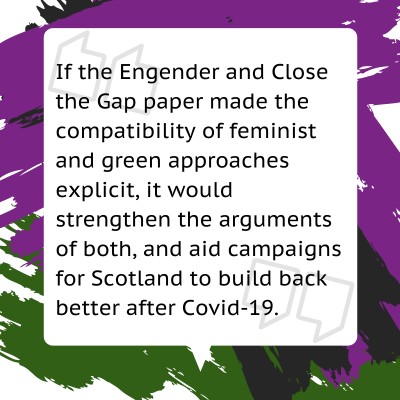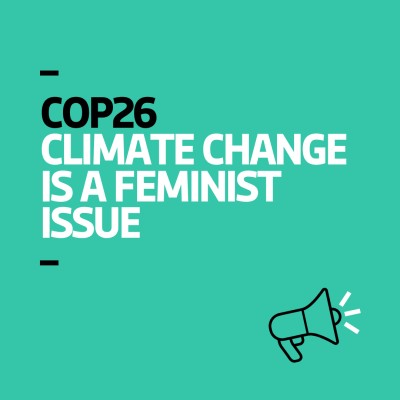Engender blog
Climate Change is a Feminist Issue
Over the next two weeks COP26 is taking place in Glasgow, where governments will negotiate actions and rules for addressing climate change.
We all know that climate change is a feminist issue, particularly because the effects are already being felt disproportionately by women and communities of colour across the world. If you want to find out more, Gal-dem’s new series ‘It’s Happening Now’, explores the effect of the climate crisis and campaigns for change to address its effects on marginalised communities in the UK and around the world. They are publishing a series of articles during, and beyond, COP26 which you can access here.
F-words: Gendered language - the Maker movement and its technology narrative
Dr Elisabeth Loose has just finished her PhD thesis on the amateur technology Maker movement, its gender balance and connection to environmental sustainability at the University of Glasgow’s School of Interdisciplinary Studies. She has recently become self-employed to support charities and social causes with their communications. Follow Elli on Instagram at @elli.ellixir where she advocates for inclusive social impact marketing.
-400.png)
GUEST POST: A recovery plan which works for women also works for the planet

Claire Duncanson is a Senior Lecturer in International Relations at the University of Edinburgh. She has published widely on issues relating to gender, peace and security, with a particular focus on gender and peacebuilding. Her current work aims to bring a feminist analysis to the political economy of building peace, and she's an active member of the Women’s International League for Peace and Freedom (WILPF). You can follow Claire on Twitter @cpduncanson, read more blogs at GenderED, and find out about her academic research here.
Engender and Close the Gap’s new paper outlining nine principles for economic recovery provides a valuable roadmap for Scotland to emerge from Covid-19 in ways that address the pandemic’s alarming gendered impacts. However, as important as its ideas are, it fails to make a critical connection, one at the heart of our country’s future. While the paper’s nine principles are offered as a path to a fairer, more just, more equal and inclusive Scotland, they can and must also be understood as providing a strong foundation for addressing and arresting the climate and biodiversity crises. This is an increasingly urgent task given Scotland’s recent rise in carbon emissions and its damaged and depleted ecosystems, but mention of this potential benefit of their approach is surprisingly absent from the paper.
Downloads
 Engender Briefing: Pension Credit Entitlement Changes
From 15 May 2019, new changes will be introduced which will require couples where one partner has reached state pension age and one has not (‘mixed age couples’) to claim universal credit (UC) instead of Pension Credit.
Engender Briefing: Pension Credit Entitlement Changes
From 15 May 2019, new changes will be introduced which will require couples where one partner has reached state pension age and one has not (‘mixed age couples’) to claim universal credit (UC) instead of Pension Credit.
 Engender Parliamentary Briefing: Condemnation of Misogyny, Racism, Harassment and Sexism
Engender welcomes this Scottish Parliament Debate on Condemnation of Misogyny, Racism, Harassment and Sexism and the opportunity to raise awareness of the ways in which women in Scotland’s inequality contributes to gender-based violence.
Engender Parliamentary Briefing: Condemnation of Misogyny, Racism, Harassment and Sexism
Engender welcomes this Scottish Parliament Debate on Condemnation of Misogyny, Racism, Harassment and Sexism and the opportunity to raise awareness of the ways in which women in Scotland’s inequality contributes to gender-based violence.
 Gender Matters in Social Security: Individual Payments of Universal Credit
A paper calling on the Scottish Government to automatically split payments of Universal Credit between couples, once this power is devolved to the Scottish Parliament.
Gender Matters in Social Security: Individual Payments of Universal Credit
A paper calling on the Scottish Government to automatically split payments of Universal Credit between couples, once this power is devolved to the Scottish Parliament.
 Gender Matters Manifesto: Twenty for 2016
This manifesto sets out measures that, with political will, can be taken over the next parliamentary term in pursuit of these goals.
Gender Matters Manifesto: Twenty for 2016
This manifesto sets out measures that, with political will, can be taken over the next parliamentary term in pursuit of these goals.
 Scottish NGO Briefing for UN Special Rapporteur on Violence Against Women
Joint briefing paper for the UN Rapporteur on Violence Against Women.
Scottish NGO Briefing for UN Special Rapporteur on Violence Against Women
Joint briefing paper for the UN Rapporteur on Violence Against Women.

Newsletter
Sign up to receive our newsletter here:
Sign up to our mailing list
Receive key feminist updates direct to your inbox:
